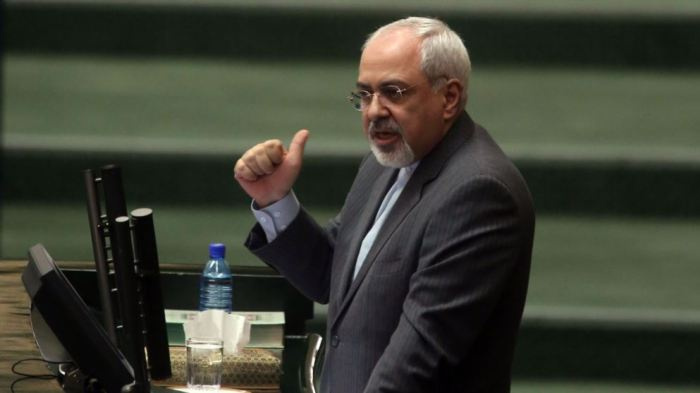Zarif and Obama: An Accidental Encounter

(Photo: AFP)
By: Ali Attaran
"Handshakes cannot solve problems between Iran and the US." Thus said Hassan Rouhani in his meeting with senior American media figures on Friday September 25th. With a historic deal sealed in mid-July in Vienna, hopes were high that New York would be the next stop in Tehran and Washington's path towards reconciliation. No handshake took place between the chief executives of the two countries. Yet, on Wednesday morning the Iranian media were abuzz with the rumor-turned-news of the handshake between US President Barack Obama and Iranian Foreign Minister Mohammad Javad Zarif.
This was not the first time expectations were high for reconciliation between archenemies Iran and the US. It had once emerged seventeen years ago, when a new promising face in Iran, Mohammad Khatami, had made his maiden trip to the UN. It seemed a perfect chemistry: a Reformist, pro-détente president in Pasteur, a Democratic president in the White House could tear down what Khatami had called "a wall of mistrust," between Iran and the United States.
Yet, high expectations fell flat. Bill Clinton attended Khatami's speech, although the Iranian team had left their seats during his opening speech on the morning of the same day. Wary about reactions in Tehran, the conservative entourage of Khatami and co. had made arrangements such as to avoid any possible contact with the American team.
Even then, according to one narrative that appeared in the Iranian media, Bill Clinton had made personal efforts to break the ice: he had returned to the UN Headquarters in the afternoon, prior to Khatami's speech, and had entered the waiting hall in hope of meeting the Iranian president. But Khatami was a no-show and Clinton left after shaking hands with a bodyguard and a chauffeur of the Iranian entourage.
Sporadic unrequited initiatives of Mahmoud Ahmadinejad, Khatami's successor, failed due to his lack of diplomatic credibility among the world powers, and the outwardly unappealing nature of his political agenda. His evangelical letter to the US President George W. Bush did not receive a response; neither did his charm offensive in sending a letter of congratulation to Barack Obama upon his election in the 2008 presidential election.
Rouhani, who rose to presidency on a platform of détente and resolution of the nuclear standoff, took one timid step towards direct contact with Barack Obama during his first visit to New York in 2013, when he held a brief phone conversation with the US president before his departure to Tehran. He was fiercely criticized by the Principlists back in Iran, and also received a mild criticism from the Supreme Leader Ayatollah Khamenei.
Direct contact between Iranians and Americans is no longer a political taboo inside Iran after two years of breathtaking nuclear talks (some social media users quipped that the Iranian foreign minister would not meet his American counterpart so frequently had there been no enmity between the two countries for the last 35 years). That created hopes for diplomatic meetings upgrading to a president-to-president scale. Rouhani shattered such hopes in his meeting with the American media organizers. The rock star of his cabinet, Javad Zarif, however, made an effort to that end through his short encounter with the US president on Tuesday.
After a brief silence on Tuesday evening, hardliners started their attacks on Zarif, especially via the parliamentary tribune. "Mr. Zarif's handshake with Obama deserves a serious response" said Alireza Zakani, influential Principlist member of the parliament . "Majles will not back down in this case." Bahram Beyranvand, MP from the western city of Boroujerd, was hypercritical. "Thousands of hajis were embracing death in Mina,", he said, referring to the deadly Mina Stampede, "and Zarif was embracing Obama and the US Secretary of State". Beyranvad continued in such a vitriolic language that Mohammad-Hassan Aboutorabi, deputy speaker of the parliament and moderator of the parliamentary session on Wednesday, had to mute his microphone.
Pro-government media tried to appease the critics by calling the encounter between Zarif and Obama "incidental". Yet it is clear that the hardliners will not buy the justification. "Why are all troublesome cases such as this one [i.e. Zarif's meeting with the US president], or Mr. Rouhani's phone conversation with Obama always incidental?" asked Zakani. "Why don't we see an incidental decline of [consumer] prices? Or incidental improvement of [home-made] automobiles?"
But this is only a prelude to what Zarif will face at home. Definitely, the Iranian foreign minister has to face a tough Q&A session once summoned to the parliament, and he will most likely be threatened with impeachment (though it is hardly likely that he, as Iran's nuclear tsar, loses his seat while the nuclear deal is still at its embryonic phase).
For better or worse, Iran has used its post-Revolution 'zero contact with the US' approach as a powerful card and with it secured a foothold in the Muslim street. Rouhani's administration has now decided to wield this card in order to achieve its strategic goals. In this way, it should neither miss the opportunity by yielding to the ruckus created by ever-skeptical Principlists, nor overplay its hand by following the simplistic outlook of hyper-optimists that view rapid détente with the US as panacea for the entire package of challenges that Iran is facing.
(Note: this piece was originally published under the headline "An Incidental Encounter")

